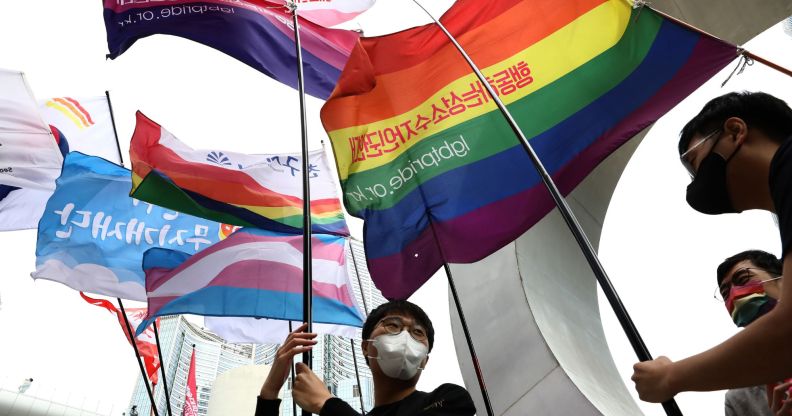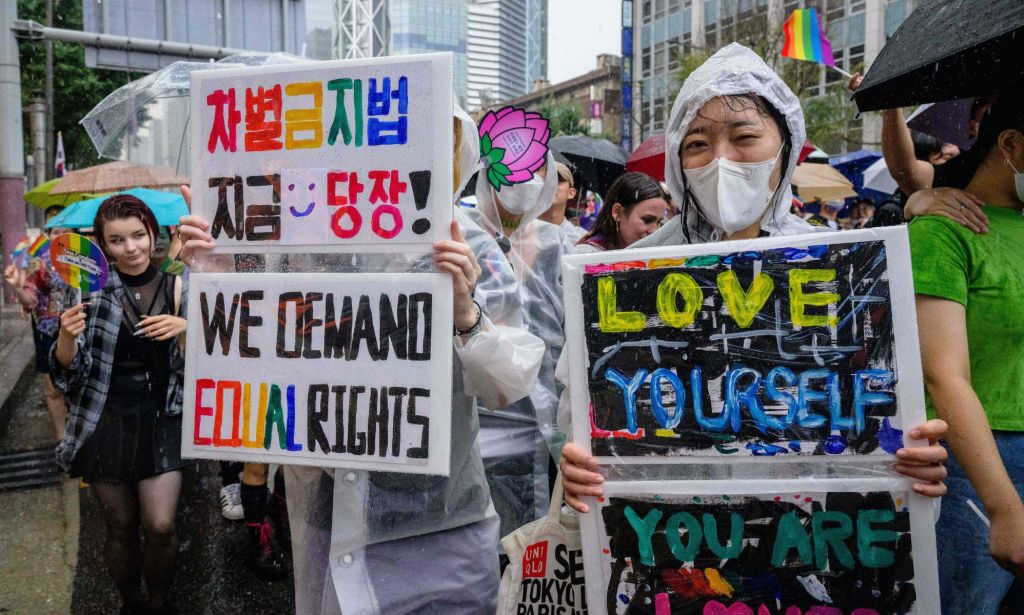South Korea: Human rights boss makes crude, homophobic ‘anal rupture’ claim in draft ruling

LGBTQ+ and human rights advocates have called for South Korean human rights commissioner Lee Choong-sang to resign after he made homophobic remarks in a draft decision. (Getty)
LGBTQ+ organisations in South Korea have called for the resignation of a human rights commissioner who made a homophobic remark about queer men and anal sex.
Lee Choong-sang, a human rights commissioner at South Korea’s Human Rights Commission, sparked criticism after he made the remarks in a draft resolution about regulations concerning the hair-length of servicemen.
Objecting to the view that forcing military personnel to have short hair is a violation of their human rights, Lee went on to make an anal sex analogy.
According to Kyunghyang Shinmun and SBS, he said that queer men who engaged in anal penetration – which he described as taking on a “female role” – to the point their “anus is ruptured”, leading to them “wearing a diaper”, are doing so willingly and are not victims of human rights violations.
His view did not appear in final published decision about the regulations.
Several human rights commissioners reportedly asked Lee to reconsider his opinion which they described as discriminatory.
Rainbow Action, a coalition of LGBTQ+ groups and one of the biggest queer activism organisations in South Korea, protested outside the National Human Rights Commission on Tuesday (23 May) alongside the HIV and Aids Human Rights Activists Network and Human Rights Policy Response Group.
The activists roundly condemned the speech and filed a complaint against his remark, calling for Lee’s immediate resignation.
In a joint statement released ahead of the protest, the activists said it was “shocking” that a standing commissioner is “continually spewing hate speech” against LGBTQ+ people.
They added that the fact Lee tried to include this statement in an official decision showed his ‘lack of qualifications’ as a human rights commissioner.
“The phrase that commissioner Lee tried to include in the resolution is not only irrelevant to the issue of the military forcing short hair on individual soldiers, but also hate speech that incites hate and discrimination against sexual minorities,” the groups said.
South Korea still lags behind other countries on LGBTQ+ rights
There is no comprehensive national law to protect queer South Koreans from discrimination based on their sexual orientation or gender identity.
Same-sex marriage remains illegal in the East Asian country and queer couples can’t expand their families through adoption, while LGBTQ+ students face discrimination in schools, according to a damning Human Rights Watch report.
While homosexuality is legal, queer relationships are prohibited in the armed forces. Military service is mandatory, with able-bodied men, aged from 18 to 35, forced to serve for between 18 and 22 months.
Religious groups hold immense sway over national politics, and they have been loud in condemning the LGBTQ+ community.

There is a burgeoning Pride movement in South Korea to fight back against the anti-LGBTQ+ rhetoric. The Seoul Queer Culture Festival (SQCF) has been held at Seoul Plaza every year since 2015, except during the pandemic, to celebrate and support the country’s LGBTQ+ community.
But earlier this month, SQCF organisers said they were turned away from the venue this year in favour of a Christian youth concert.
The concert is being held by the CTS Cultural Foundation, which is linked to broadcasters the Christian Television System that opposes LGBTQ+ identities and the Pride event.
SQCF organisers promised the “festival will not be stopped” despite the setback.

